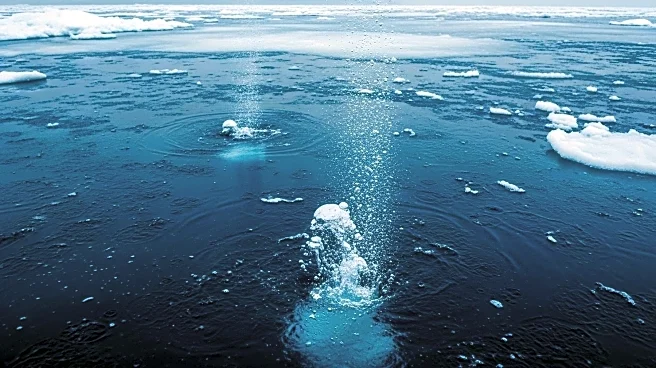What is the story about?
What's Happening?
Scientists have discovered methane escaping from the Antarctic seabed at an alarming rate, raising concerns about underestimated global warming predictions. Methane, a potent greenhouse gas, is leaking from cracks in the seabed, with new seeps being identified in the Ross Sea. These seeps were found using acoustic surveys and remotely operated vehicles, revealing more than 40 new sites. The discovery suggests a fundamental shift in methane release in the region, which could rapidly transfer methane into the atmosphere. The study, published in Nature Communications, highlights the potential impact on climate change and marine life.
Why It's Important?
Methane is a super-polluting gas that traps significantly more heat than carbon dioxide, making its release a critical concern for climate change. The discovery of new seeps in Antarctica could indicate a previously underestimated source of greenhouse gas emissions. If these seeps contribute to atmospheric methane levels, they could accelerate global warming, impacting ecosystems and weather patterns. Understanding these seeps is crucial for accurate climate modeling and policy-making. The findings may prompt increased scientific research and monitoring efforts to assess the potential risks and develop mitigation strategies.
What's Next?
Scientists plan to return to Antarctica for further analysis of the methane seeps, aiming to understand their causes and potential impacts. The research could lead to new insights into the relationship between climate change and methane release. Policymakers may need to consider these findings in future climate agreements and emission reduction targets. The study could also drive international collaboration in monitoring and addressing methane emissions. As research continues, the scientific community will likely focus on developing technologies to detect and mitigate methane leaks.
Beyond the Headlines
The discovery raises ethical and environmental questions about human impact on remote ecosystems. The potential feedback loop between climate change and methane release highlights the urgency of addressing global warming. The study underscores the importance of international cooperation in tackling climate-related challenges. It also emphasizes the need for public awareness and education on the implications of methane emissions.















